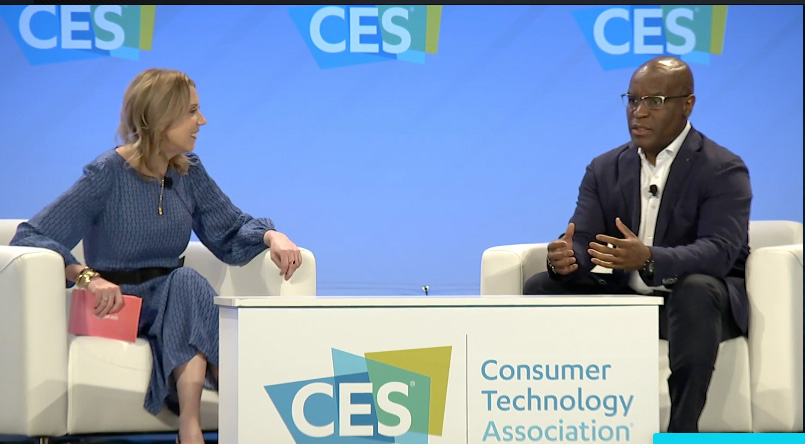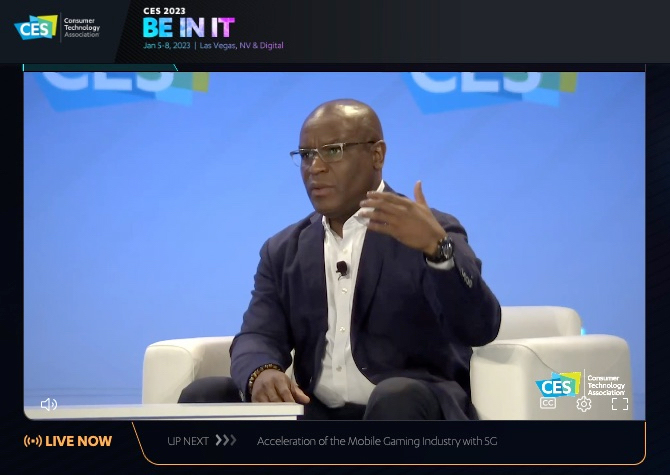“Just as you measure media success, measure your success in sustainability.”
Kirk McDonald, CEO of GroupM North America and the Global CEO of Choreograph
We have all been living the legacy of climate change via record-setting weather patterns around the world. And customer preferences for brands that practice sustainability are – or should be – known by every current CEO. The most recent stat was shared by Amy Armstrong, Director, Global Customer Development at Amazon Ads, in a session this past Thursday at CES: Amazon’s 2022 study found that 62% of consumers want to engage with brands that actually practice sustainability. 75% of those customers are “a little fed up with brands that feel like they could be excused from environmental sustainability,” she noted. Beyond brand preference, though, growing greenhouse gasses will impact every form of business.
And every form of business, including the media, marketing and ad industry, can play a part in greater conservation.
“How Media Sustainability is Shaping the Future of Advertising” was the topic of Armstrong’s discussion with the erudite Kirk McDonald, CEO of GroupM North America and the Global CEO of Choreograph, WPP’s global data company, who provided specific actions the industry can take. It starts with knowledge: “You really need to understand the carbon impact of your ad placements. You’d be amazed how much the advertising industry is sucking into the energy of the world,” Armstrong said.

Such as?
Think, McDonald said, about the things that impact how media inventory supply is created and used. “We’ve talked a lot in this industry about the ad tech part — which relies heavily on algorithms, machine learning servers that do the work of behavioral targeting, etcetera. …Careless use of ad targeting and data burns cycles on servers that drains and creates a carbon imprint that we don’t need to have.”
Talk is Cheap. Carbon Offsets are Not the Only Cost.
Aside from a cash tax, McDonald wants us to think about the carbon tax associated with our dependency on audience or data targeting. But it’s not enough to “pay it forward” with carbon offsets. McDonald described them as a mitigation effort that is “an AND, not a “versus”: “’If I create this carbon load why don’t I buy my way out of that load by doing something good someplace else?’ It’s dangerous if offsets become the ‘or’, because then I do carbon offsets so I can keep being bad but give the appearance that I’m good as a company.”
McDonald stressed that “it is about reducing the load AND offsetting. Carbon offsets can be the gateways to look at workflow improvements and how to change old practices and attack the reduction effort.”
For the ad industry, reduction may mean looking at how many creative assets or how much targeting is really needed in a campaign and how many cycles are bid to buy programmatic advertising. “We have to start thinking conservatively about what is going to generate impact and grow business but grow it in a healthy sustainable long term way,” he added. Then, just as you measure media success, measure your success in sustainability.
Measure What Matters: In Business and Sustainability
A frequent issue among sustainability strivers is how to measure and remain accountable for specific actions; that “inconvenient” but necessary shift in business practices. There’s also a truism that you can’t manage what you don’t measure. But just as the recent refrain of the ad industry has been around measurement standards, this is another area where, McDonald said, “our efforts need to align to measure the impact that we’re having.” Because, he added, “if everyone is left alone to define that on their own, we won’t ever get anywhere. So, we need methodology … a language that we can use together as an industry … to come together on what progress looks like.”
And coming together and education was the clarion call for this panel:
McDonald emphasized the need to collaborate on what those progress milestones are. This is not dissimilar to how the industry has aimed to come together around brand safety issues and created GARM (Global Alliance for Responsible Media.) “We want to do this as open source. We don’t have all the answers,” acknowledged McDonald, “and as a matter of fact, I love what some of our competitive holding companies are doing. There’s good work to be done but just as we did around other initiatives we need to start baking together, with everyone bringing a different ingredient and adding to it that collaborative work.” McDonald provided an email address for those interested in decarbonization and a joining a GroupM coalition launched last year: [email protected].
Accountability Beyond Customer Demands
As a starting point, companies need to assign devoted internal resources that have the power to make actual changes, and executives need to start looking at partners. McDonald suggested we ask, “How do we hold each other accountable. … not to say, ‘Well, what happened?’ We’re going to help each other when I’m asking you, as a partner, to work with us so you understand what goal we’re working towards.” Then ask your partner to be public with what you’ve agreed to, such as what GroupM and Amazon Ads shared on the panel.

“We’ve seen lots of campaigns where companies, ourselves and others, talk about what we’re going to do, but a big part of this is every company holding their peer company, their partner company accountable. We would ask Amazon to hold us accountable as a partner, but in turn we then are asking permission to hold you accountable,” McDonald said to Armstrong, who nodded in agreement. “And then [GroupM] is going to start being very forceful about saying to some companies ‘we won’t work with you if you’re not trying to do something here.’ And that’s going to be a hard thing to do because it’s going to sound like we’re walking away from business, or we’re not being honest to business partnerships, but it does require that level of accountability for us to get this moving forward.”
The collaboration between GroupM and Amazon Ads is “now public,” McDonald said, likely to the chagrin of corporate attorneys. “We’ve said it on stage. This is important for our business and for our employee base, but also important for all of our partners and customers. We will owe an update a year from now that we have made meaningful progress together.”
With some plain-spoken fervency, McDonald stressed that there’s no more time for talk. “I love the conversation, and that it’s getting attention, but as with other topics inside of ESG I’m also equally frustrated we’ve been talking about it for a really, really long time and we do need to start to get up off of our patooties here and put some action in place. Then this becomes the ongoing topic at gatherings when we get together and review the progress that the industry is making towards sustainability.”
Photo by Guillaume de Germain on Unsplash











